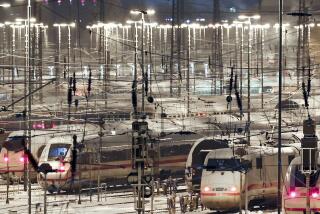German Strikes Threaten to Paralyze Air, Freight Traffic
- Share via
BONN — Widening strikes by public workers threatened to wreak havoc today on air traffic and freight transport across Europe, closing major German airports after a week of undelivered mail, uncollected garbage and idle buses failed to budge Chancellor Helmut Kohl’s beleaguered government.
So far, an estimated 110,000 members of the country’s main public service union are involved in the worst labor dispute in postwar Germany.
The Stuttgart-based Union of Public Service and Transportation Employees said work slowdowns and stoppages would spread to airports, railway yards, hospitals, kindergartens and national television unless Bonn improved its offer of a 4.8% raise.
With baggage handlers, ramp personnel and firefighters planning to walk out today, airports in Berlin, Hamburg, Hanover, Duesseldorf, Bonn/Cologne, Munich and Nuremberg were expected to close.
The union vowed to hit Frankfurt International--the busiest airport in continental Europe--on Tuesday. With nearly 30 million passengers passing through each year, Frankfurt is the third-busiest airport in the world, behind London’s Heathrow and Tokyo.
“This is the only way to force the employers to see reason,” said union chairwoman Monika Wulf-Mathies, whose organization represents 2 million workers.
The union initially sought a 9.5% wage increase and improved benefits but agreed to accept a mediator’s pay boost of 5.4%. But the government rejected the compromise, claiming it could not afford more than 4.8% because of the staggering costs of unification and rebuilding the formerly Communist eastern half of the country.
Railway workers planned to bring freight trains to a virtual standstill starting today.
“Within a few hours, not a wheel will turn,” union official Rudi Schaefer vowed.
The union also threatened to darken television screens by calling technicians off the job at an unspecified time. The three main networks would be affected, but cable programs would still be shown.
“A strike is coming into our living rooms for the first time,” said the Sunday edition of Bild am Sonntag, which published a color photograph of week-old trash piled up on Hamburg’s famous Reeperbahn strip.
A week of scattered strikes already has left millions of letters and packages mounting in post offices across western Germany, where the strikes are focused. Workers in eastern Germany, who already earn about 35% less than their western counterparts, negotiate separately and are not striking.
Ninety hospitals and convalescent homes were also due to be targeted this week, but the union indicated that administrative services only--not emergency care--would be affected.
Day-care centers and kindergartens, which are subsidized by the government, are also going to be affected by the walkout, union officials said.
Meanwhile, the world’s largest industrial trade union, IG Metall, threatened to launch warning strikes this week as negotiations with the Kohl government continued. The metalworkers are seeking 9.5% raises.
More to Read
Sign up for Essential California
The most important California stories and recommendations in your inbox every morning.
You may occasionally receive promotional content from the Los Angeles Times.












